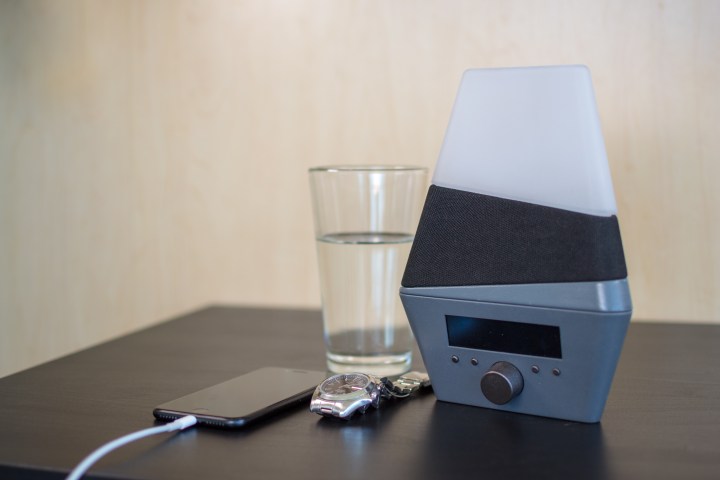
The startup, with personnel in San Francisco and London, is called Neutron Technologies. This small team looked to nature for inspiration when designing its deceptively simple-looking alarm clock. To more effectively wake up users in a more natural way, Rise gradually increases the light in a room before the alarm goes off, mimicking the sunrise. Theoretically, the light tells the human body that it’s time to wake up, so people aren’t still smashing their snooze buttons.
“We set out to build Rise, as no existing product met our needs,” explains Freddie Temperton, a founder at Neutron Technologies. “We wanted something that woke us up gently, was easy to use, and looked good in our bedrooms. We’ve since gone through countless iterations to build the ultimate wake-up light.”
Users can change the color of the clock’s LED lamps, set up to 50 alarms, and play music through the device’s 15-watt custom tuned speaker. The Rise alarm clock will have five standard alarms at launch but can also be customized to play an FM radio frequency or the user’s Spotify playlist.
Naturally, no smart home product would be released into the wild without an accompanying app to add the utility of a touchscreen interface to the base product. Neutron Technologies offers a free app that gives users complete control over everything Rise can do. Users can set alarms, control brightness and hue, change the radio station, and alter any settings on the fly. The app will also signal preset alarms if the Rise alarm clock loses power.
On the technical side, Rise has six high-powered and energy-efficient LEDs with warm and cold tones, Bluetooth compatibility, two fast-charging USB ports so users can charge their phones overnight, and an omnidirectional speaker. The radio can field a range of FM frequencies from 87.5 to 108 MHz, and is compatible with both iOS and Android smart devices.
It’s also quite elegant in its physical design, which was intentional on the part of Neutron Technologies. To make the most of Rise’s physical appearance and user interface, the company worked with renowned lighting designer Moritz Waldemeyer. Using a philosophy that employs playful experimentation to bridge the gaps between technology, art, fashion, and design, Waldemeyer has designed lighting installations for the likes of Audi, Bombay Sapphire and Microsoft, as well as costumes for U2, Rihanna, and will.i.am.
Founded in 2015 by engineer and fireworks enthusiast Temperton, along with electrical engineer Toby Isaacs and mechanical engineer and app lead Peter Garland, Neutron Technologies had a previous successful Kickstarter with OSCAR, a high-resolution display adapter that has shipped to more than 15 countries. The current project, Rise, has attracted more than 50 backers and raised nearly $10,000 toward an ambitious goal of $212,072. They’ve already sold out of their primary reward, an early-bird-priced Rise device for 110 British pounds ($154 U.S.). Currently, the company anticipates a final price for the Rise alarm clock of 160 pounds ($226), including shipping.


